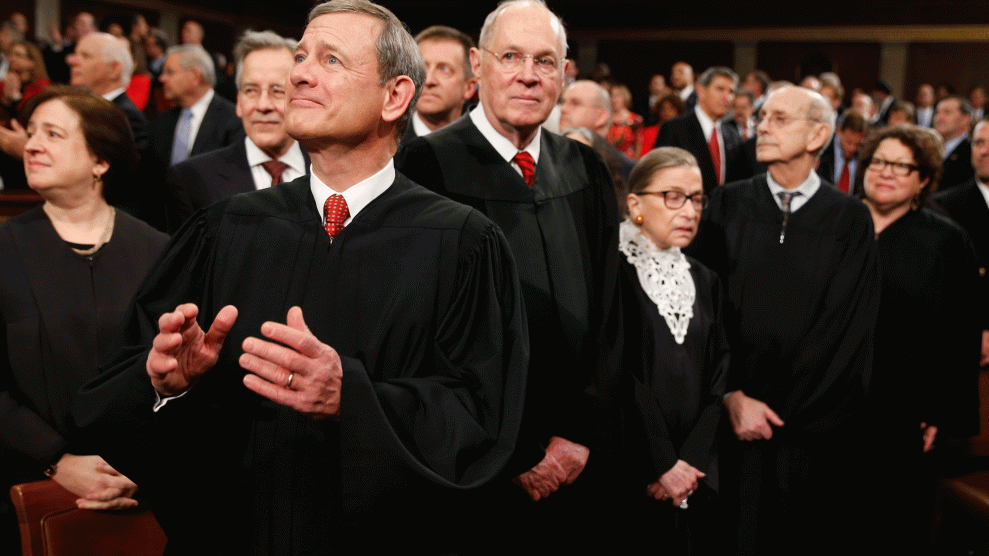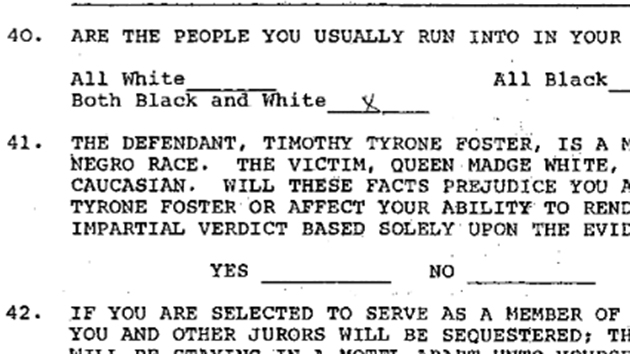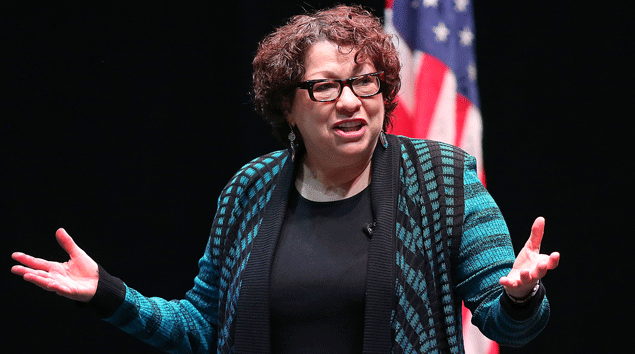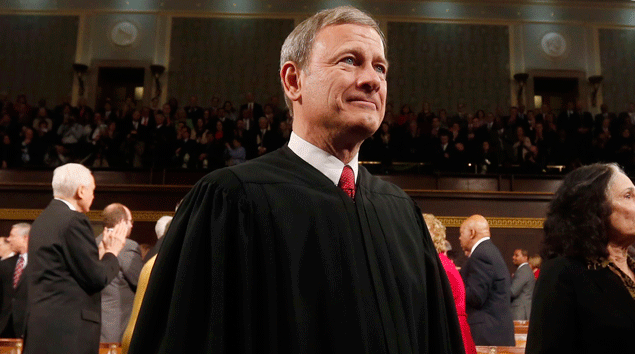
Chief Justice John Roberts Jr. at the State of the Union address, 2016Evan Vucci/AP
“Nonsense.” That’s how Chief Justice John Roberts Jr. described the contention that Georgia prosecutors had not been motivated by race when they weeded out every potential black juror from a 1987 death penalty trial. Roberts penned the majority opinion in Foster v. Chatman, which reversed a decision by the Georgia Supreme Court that overlooked new evidence of racial discrimination in the trial of Timothy Foster, an African American man, which was a factor leading to his death sentence by an all-white jury.
The case had been pending in the high court for an unusually long time, after being argued in November, suggesting that the justices were torn over how to decide it, particularly after the death of Justice Antonin Scalia. But in the end, the eight-member court ruled 7-1 that Georgia prosecutors had unconstitutionally rejected jurors from Foster’s trial based on their race. The lone dissenter was the court’s only African American justice, Clarence Thomas, who sided firmly with state of Georgia.
The case had presented stark evidence of the kind of racial discrimination that pervades the criminal justice system. In 2006, defense lawyers for Foster, who was convicted of murdering a white woman in Butts County, Georgia, pried out of the prosecutors’ office a remarkable file full of documents showing how they had gone about picking a jury for the case.
In notes, prosecutors had highlighted the African Americans on several different lists of potential jurors. On one list, under the heading “Definite NOs,” prosecutors listed six potential jurors, all but one of whom were black. The prosecutors ranked the prospective black jurors in case “it comes down to having to pick one of the black jurors.”
As Foster’s lawyer Stephen Bright said after the decision was released on Monday, “this discrimination became apparent only because we obtained the prosecution’s notes which revealed their intent to discriminate. Usually that does not happen. The practice of discriminating in striking juries continues in courtrooms across the country. Usually courts ignore patterns of race discrimination and accept false reasons for the strikes. Even after the undeniable evidence of discrimination was presented in this case, the Georgia courts ignored it and upheld Foster’s conviction and death sentence.”
Foster’s 1987 conviction came just months after the US Supreme Court had issued a decision in Batson v. Kentucky that was supposed to ban racial discrimination in jury selection during what are known as “peremptory strikes.” That’s the mechanism for lawyers in a trial to exclude jurors for no reason. Such strikes have been used extensively to keep minority citizens off juries.
Batson, though, has failed to halt the cherry-picking of all-white juries in criminal cases against black men. That’s largely because prosecutors, when challenged, have learned to justify a decision to kick someone off a jury in “race-neutral” terms, and courts have accepted them. Foster was no exception. Notes in the prosecutors’ file indicated that they focused on the race of the jurors from the outset, as Roberts points out in his opinion. They justified excluding black jurors in his case for such nebulous reasons as “failure to make eye contact” or being defiant. (One of the rejected black jurors, Marilyn Garrett, told me last year that if she wasn’t making eye contact or was defiant with the prosecutors while they were questioning her, it was because “they really were nasty to me.” She said the prosecutors had treated her “like I was a criminal.”)
Roberts didn’t buy the prosecutors’ rationale for ejecting two black jurors in particular, and he methodically ripped holes in their arguments before sending the case back to the lower courts for further proceedings. “Two peremptory strikes on the basis of race are two more than the Constitution allows,” he concluded.
The decision is a forceful blow against racism in the courts, and somewhat unusual coming from the same chief justice who has made a name for himself for helping to dismantle the Voting Rights Act and affirmative action. The Foster decision isn’t going to help Roberts’ reputation among tea partiers, including Sen. Ted Cruz (R-Texas), who have decided the former conservative darling of a chief justice has become a liberal traitor.
Tea partiers should be much happier with the lone dissenter in the case, Thomas. As he often does in death penalty cases, he opened his opinion by focusing from the outset on the victim—in this case, 79-year-old Queen Madge White, whom Thomas noted was sexually assaulted by Foster with a bottle of salad dressing. Far from acknowledging the racist motives in the jury selection, Thomas lambasted the majority ruling for perpetuating a criminal justice system in which “finality” means nothing, and any criminal case can be appealed ad nauseam.
His opinion avoids any acknowledgement of the stark failures of the justice system in recent years, injustices that would have largely remained hidden if the courts had taken Thomas’ strict view of unwavering procedural rules that until recently protected prosecutors in Georgia in Foster’s case from any accountability for their racial discrimination.
The decision in Foster won’t put an end to racial discrimination in jury selection. But it is certainly vindication for the potential jurors, including Marilyn Garrett, who weren’t allowed to fulfill their civic duty all those years ago because of their race. As for Foster, his future is still in limbo. Monday’s decision entitles him to a new trial, with a jury of his peers that hasn’t been tainted by racial discrimination. But that doesn’t guarantee a different outcome. The new Georgia jury may come to the same conclusion as the old one. But if nothing else, his date with the death chamber has likely been put off for many years to come. In the world of death penalty litigation, that counts as a win.
















